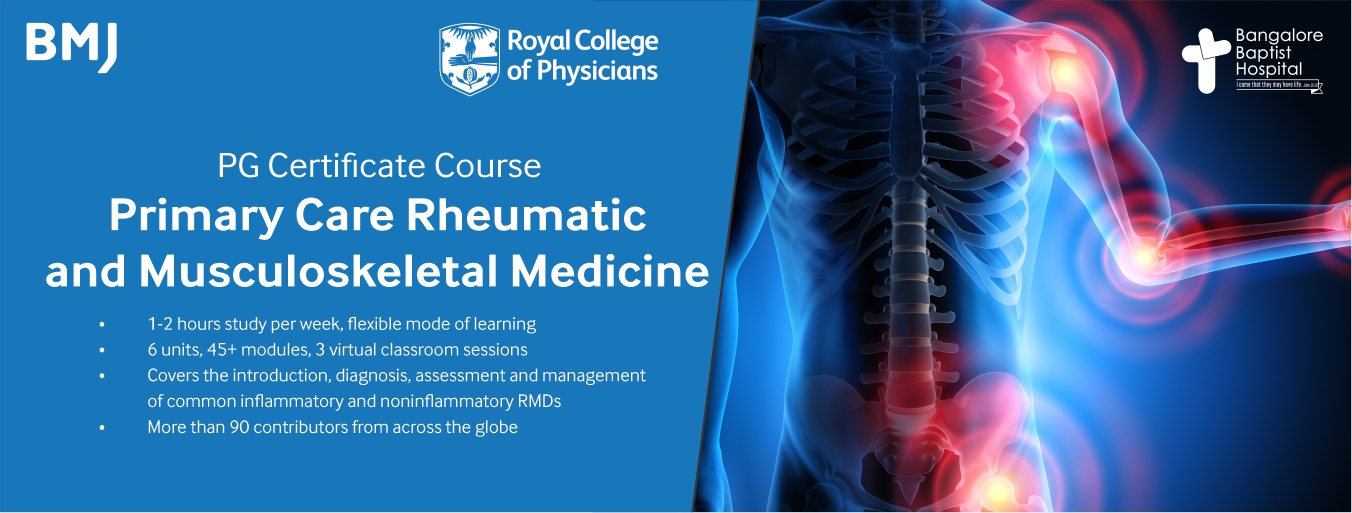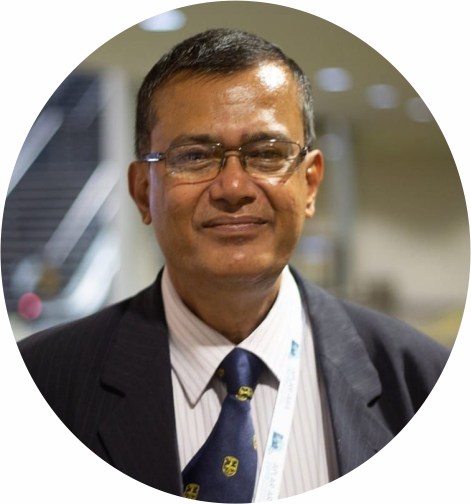
Curriculum
| PG Certificate Course in Primary Care Rheumatic and Musculoskeletal Medicine (with contact program) | Curriculum | |
| PG Certificate Course in Primary Care Rheumatic and Musculoskeletal Medicine (Only online) | Curriculum | |
| Unit in charge and course authors | Authors |
Course Directors

Dr. Debashish Danda
MBBS, MD (General Medicine), DM ( Clinical Immunology & Rheumatology), Advanced training in Rheumatology (Australia), FRCP (London), FACR, FAMS, FICP Director, Professor and Senior Consultant, Institute of Rheumatology, Arthritis and Auto-immunity and Dean - Clinical & Interdisciplinary Research, Narayana Health City Bangalore

Dr. Kieran Walsh
Clinical Director at BMJ.
Clinical lead of the medical education and clinical decision support products at BMJ, including BMJ Best Practice.
He is a Fellow of the Higher Education Academy, a Fellow of the Royal College of Physicians of Ireland, a Fellow of the Academy of Medical Educators, and Adjunct Associate Professor at Monash University. In the past, he has worked as a hospital doctor specialising in General Internal Medicine and Geriatric Medicine.
He has a vast amount of experience in online medical education, clinical decision support, face to face delivery of medical education, and both summative and formative assessment.
He has published over 200 papers in biomedical literature and has written four books: the first and only book on cost-effectiveness in medical education; a dictionary of quotations in medical education; a history of medical education in 100 images; and the Oxford Textbook of Medical Education.
About this course
Welcome to this new course on "Primary Care Rheumatic and Musculoskeletal Medicine", that will be a simple, feasible and practical primer to Musculoskeletal & Rheumatologic illnesses especially written in context of treating South Asian population.South Asian countries have one of the lowest prevalence of trained rheumatologists in the world. Generally, primary care doctors are the first point of contact & often the long term follow up doctors for patients with RMDs.
Skilled primary care doctors are a link between patients and rheumatologists
A rapport between upskilled primary care doctors with the nearby rheumatologists will go a long way towards rational treatment of RMDs in semi urgent and urgent situations in the community. This model will prevent disability by quick action at an early preventable stage and thereby enhance safe and holistic care for the patients.
This short online course with 45+ modules prepared by expert rheumatologists from across South Asia & beyond, will be supplemented with periodic virtual classroom sessions.
We believe this PG certificate course will bridge the gap in musculoskeletal health in the South Asian community.
By Dr. Debashish Danda
Course Director
Professor and Founder
Department of Clinical Immunology and Rheumatology
Christian Medical College and Hospital, Vellore, India
President, Asia Pacific League of Associations for Rheumatology (APLAR) [2021-2023]
Chair, ILAR (2023)
Why take this course?
Course Highlights- Trusted content - Brought to you by the publisher of The BMJ journal with a legacy since 1840 in providing healthcare knowledge and expertise to healthcare professionals.
- Course contributors - The peer reviewed course content is authored by more than 90 subject matter experts from across the globe.
- GLocal - International editorial guidelines with local context.
- Elaborate content coverage - The curriculum includes common rheumatic and musculoskeletal conditions as follows: Non-inflammatory conditions such as back pain, Osteoarthritis, Chronic pain/Fibromyalgia, Soft tissue Rheumatism, Osteoporosis, Hypermobility of joints, Rheumatic manifestations of systemic diseases like Hypothyroidism, Diabetes Mellitus, low Vitamin D state etc. Inflammatory conditions such as Rheumatoid Arthritis, Spondyloarthritis (SpA) including Ankylosing Spondylitis, Psoriatic Arthritis, Reactive Arthritis, enteropathic & undifferentiated SpA, Crystal Arthritis like Gout and Infective Arthropathies including Viral & Septic Arthritis. This course also covers emergencies and serious RMDs such as connective tissue diseases including Lupus and Vasculitides for a quick recognition to enable immediate treatment & a prompt referral to a rheumatologist.
- Pedagogy - Interactive live classroom sessions, text and video based learning and online assessment
- Certification - On successful completion of course by BMJ (minimum passing percentage required is 70%)
Course Structure
E-learning:
The course comprises 6 units with a total of 45+ modules. After the completion of all the 45 modules there will be a final evaluation in the form of MCQs [Multiple Choice Questions].Each month one unit will be unlocked to study and participants can take an assessment post each module. Final evaluation at the end of the course.
Video Lectures:
- Introductory video lecture presented by Dr. Danda (course director) providing an overview of the course
- Three video lectures by course faculty. Virtual interaction with course faculty on the 6th month after the commencement of the course.
Contact program:
Three days of contact program at Bangalore Baptist hospital (download brochure from curriculum for details)Examination Format:
MCQs, OSCE, VivaDates of the virtual interactive session with the faculty will be communicated to the candidates through emails prior to the interactive session.
Eligibility criteria
Candidates must hold an MBBS degree from a recognized institute
Contact Us
For more information, please write to us at education.india@bmj.com or you can call us at 91-120-4345733, +919650052070 (09:30 AM - 05:00 PM, Monday to Friday).
Course objectives
- After completing this course, you should be able to:
- 1. Familiarise primary care doctors with common and serious rheumatic diseases in the community
- 2. Upskill primary care doctors by an overview on clinical features, diagnostic & basic management approach to rheumatic musculoskeletal illnesses in the community.
- 3. Train clinicians in the periphery to act as a link between rheumatologist & the patient for interim management issues & not as a replacement for Rheumatologist
- 4. Application of the expertise in primary care rheumatology to protect patients with rheumatic musculoskeletal diseases from quackery & misinformation driven mismanagement, which can prevent long term disability using scientific & economic therapeutic options in modern medicine.
- 5. Knowledge gained by this course should assist primary care doctors in recognising red flag scenarios that need immediate referral to rheumatologist.
